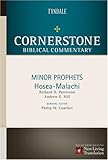This is another commentary contained within Volume 10 of the Cornerstone Biblical Commentary. See my review of Andrew Hill’s Commentary on Micah for my thoughts on the layout of this commentary series.
Introduction
Nahum’s main message is the impending doom of wicked Nineveh. We know very little of who Nahum is, but Patterson tentatively places him at a time when Israel were reduced to Assyrian vassalage during the reign of evil king Manasseh. Despite the predicament they find themselves in, Nahum believes in God who is still sovereign over the nations, and faithful to his covenant promises. Nahum portrays God as the “divine warrior”, who subdues nature and his enemies, while protecting his own people.
Commentary
On Nahum 1, a strong emphasis is placed on God’s sovereignty over the nations, his omnipotence and his justice. Nahum chapters 2 and 3 are focused more on the destruction of Nineveh. A lot of translation notes are provided explaining the difficulties determining the exact meaning of many of the verses. The included NLT translation smoothes over most of these difficulties. Enough historical and geographical information is given to help make sense of much of the imagery, including some historical details on the savage brutality and treachery of the Assyrian empire.
Despite the bleakness of much of Nahum’s prophecy, Patterson does manage to find some fruitful avenues for application including reflections on the justice of God and sovereignty of God, as well as the need to work to transform the evil within our society. As with the other volumes in this series, he willingly draws on other parts of the Bible to help shed light on the message of Nahum.
Conclusion
I appreciated the way this brief commentary helped me get a solid understanding of Nahum’s main message and put it into some sort of historical context. The way he ties in themes from Nahum with other Biblical passages is also very helpful for those who, like me, have always found Nahum a difficult book to “get anything out of”.

